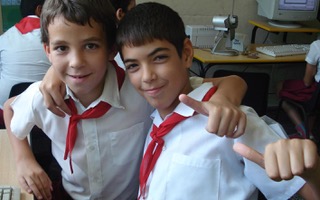On the 1st of February this year the Cuban government began drafting a new family code for the country’s constitution. This new family code will change how the state sees a family, which will broaden rights for many citizens, including children and the LGBTQ+ community.
The drafting of the new family code involved more than 6 million people and more than 79,000 meetings—an impressive amount of work, which involved more than 57 per cent of the country’s population, showing the rest of the world how to truly involve the citizens in building their country.
The existing family code in Cuba’s constitution does not include recognition of marriage for same-sex couples. It also does not state what a family is: it simply states that “marriage is the voluntarily established union between a man and a woman, who are legally fit to marry, in order to live together,” and that “the parents have the duty to provide nourishment for their children . . . contribute actively to their education and integral development . . . It is the children’s duty, in turn, to respect and help their parents.”
While parts of the present constitution regarding the rights of children are advanced for when it was written, it needs updating to match modern life in Cuba and the people’s wants and needs. Among the issues that were raised by the popular constitution were marriage equality, parental responsibility, adoption, the order of surnames, and violence in the family. The new document brings together 483 articles covering the issues raised during the meetings. Some of these articles include the right to form a family without discrimination, which includes same-sex marriage, the right to a family life free of violence, and that adolescents and children will be seen as subjects of rights and not objects of protection.
Yamile González Cabrales, president of the Civil, Administrative and Labour Chamber of the People’s Provincial Court in the province of Granma, explained that the legal framework for children and adolescents should be updated according to their duties and rights.
On 15 May the National Electoral Council delivered its conclusive summary of the popular consultation, which includes statistical data, to the National Assembly of People’s Power, the only body in Cuba that is vested with both constituent and legislative authority, and which holds its meetings publicly. It gave all data received to the drafting committee, which was established last year.
According to the minister of justice, Oscar Silvera Martínez, “the drafting of this critical, historic document has been a work of consensus-building and meticulous study.” The drafting committee was responsible for making decisions on any amendments and modifications that are based on the popular consultation that was held for the public to make amendments. This draft was then sent back to the Assembly of People’s Power, which will be voted on for a referendum.
While a traditional family unit will remain common, it is important to recognise and protect the rights of citizens to choose how they wish to form their own family. Article 81 of the constitution reads: “The State recognises and protects the family, no matter how it is organised, as the basic cell in society and it creates the conditions to guarantee that its purposes may be achieved as a whole. Families may be constituted legally or by common law, based on love and the equality of rights, obligation and opportunities for its members.” The new family code is to be in line with this article.
The democratic process that Cuba has gone through to change this part of its constitution is a lesson in democracy for the rest of us. Involving the population throughout the process of drafting and amending, the document creates a society in which voices are heard and taken into account. Bringing the general population into the debate and discussion on new legislation will allow the issues within existing legislation and policies to be heard by those in the party. Only through allowing the general population to voice their opinions and take part in the process of drafting and amending their country’s legislation can true democracy be achieved.
The referendum will take place in September.






